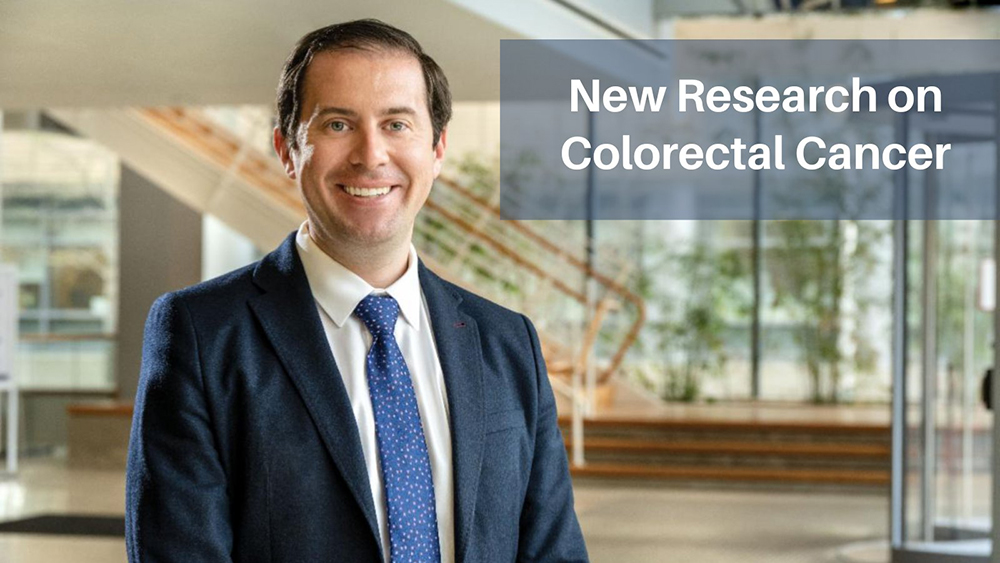|
Getting your Trinity Audio player ready...
|
Edited by: TJVNews.com
Marisa Peters, a seemingly healthy and active woman in her 30s, was blindsided by a grim diagnosis: colorectal cancer. As described in a recently published report in the New York Times, despite experiencing symptoms for years, including rectal bleeding and changes in stool consistency, medical professionals initially dismissed her concerns as routine postpartum issues or hemorrhoids. However, a colonoscopy in 2021 revealed the shocking truth, leaving Ms. Peters grappling with the reality of her diagnosis.
“I did not expect that cancer was going to be what they found,” Ms. Peters expressed to the NYT, reflecting on her journey to diagnosis.
Her experience is not isolated. A recent report from the American Cancer Society highlights a troubling trend: colorectal cancer rates are escalating among younger demographics, particularly those in their 20s, 30s, and 40s, according to the information provided in the NYT report. Paradoxically, while incidence rates decline in individuals over 65, the prevalence of early-onset colorectal cancer continues to surge.
Dr. Michael Cecchini, co-director of the colorectal program at the Center for Gastrointestinal Cancers at Yale Cancer Center, underscored the severity of the situation during an interview with the NYT. “It’s unfortunately becoming a bigger problem every year,” he stated, citing a consistent 2 percent annual increase in early-onset colorectal cancer since the mid-1990s. The NYT report also indicated that this alarming rise has propelled colorectal cancer to become the leading cause of cancer-related deaths among men under 50 and the second-leading cause among women in the same age group in the United States.

The implications of this trend are profound, raising concerns about the efficacy of current screening guidelines and the need for heightened awareness among both healthcare providers and the general public. With colorectal cancer posing a significant threat to younger adults, early detection and intervention are paramount in improving outcomes and reducing mortality rates.
Caitlin Murphy, an associate professor and cancer researcher at UTHealth Houston, shed light on this perplexing issue. When speaking with the NYT she highlighted a crucial distinction within colorectal cancer diagnoses, noting that the surge is primarily driven by an uptick in rectal cancers and those located in the left or distal side of the colon. “That maybe provides an important clue for understanding what might be going on,” Dr. Murphy suggested, according to the NYT report, hinting at potential factors contributing to this phenomenon.
Moreover, early-onset colorectal cancers exhibit distinct characteristics, often presenting as more aggressive and advanced compared to those diagnosed in older individuals. Despite this, routine cancer screenings, which have proven effective in detecting and mitigating colorectal cancer in adults over 50, are not recommended for younger populations, as was noted in the NYT report. The recent adjustment by the U.S. Preventive Services Task Force, lowering the recommended age for colorectal cancer screening from 50 to 45, reflects a recognition of the shifting landscape of this disease.
While the majority of colorectal cancer cases still occur in individuals over 50, projections indicate a significant uptick in diagnoses among younger cohorts. A study published in the Journal of the National Cancer Institute underscores this point, revealing that millennials born around 1990 face twice the risk of colon cancer and four times the risk of rectal cancer compared to previous generations, the report in the NYT said. Dr. Murphy emphasized that as these higher-risk generations age, diagnoses are likely to continue rising, amplifying the urgency of addressing this growing health crisis.
Dr. Cecchini focused his remarks on the role of genetic mutations in driving cancer development in younger individuals. However, the NYT report said that he noted that while having a family history of colorectal cancer can heighten one’s risk, genetic changes alone fail to provide a comprehensive explanation for this troubling trend.
Indeed, lifestyle and dietary habits have also come under scrutiny as potential contributors to the surge in early-onset colorectal cancer cases. Dr. Andrea Cercek, co-director of the Center for Young Onset Colorectal and Gastrointestinal Cancers at Memorial Sloan Kettering Cancer Center, points to a significant shift in recent generations’ consumption patterns. According to the information provided in the NYT report, increased intake of red meat, ultraprocessed foods, sugary beverages, and a rise in binge drinking, coupled with a decline in physical activity, have all been linked to elevated cancer risk. However, Dr. Cercek cautions that these lifestyle factors alone cannot fully account for the spike in early-onset colorectal cancer cases.
Furthermore, the traditional risk factors associated with colorectal cancer, such as smoking, typically require prolonged exposure before cancer manifests. Dr. Cercek highlighted the paradox of many young patients who defy these risk profiles, with some being athletes and others maintaining healthy lifestyles from childhood through adulthood.
Dr. Cercek also shed light on emerging research exploring the role of the gut microbiome in colorectal cancer development among young individuals. When speaking with the NYT, she discussed the impact of various medications, including antibiotics, nonsteroidal anti-inflammatory drugs, proton pump inhibitors, and psychiatric medications, on gut health and their potential association with early-onset colorectal cancer.
Moreover, experts are scrutinizing environmental exposures to toxic chemicals as a potential driver of early-onset colorectal cancer. Dr. Murphy underscored the intricate interplay between environmental factors, geography, race, and sex in shaping colorectal cancer rates. As was noted in the NYT report, she pointed out the shifting patterns of colorectal cancer diagnoses among different demographic groups over time, highlighting the need to unravel the underlying environmental determinants.
For decades, colorectal cancer rates were disproportionately higher among non-Hispanic Black individuals. However, the NYT report said that recent research indicates a significant increase in colorectal cancer cases among non-Hispanic white populations in the 1990s and early 2000s. The report also mentioned that Dr. Murphy raised thought-provoking questions about the potential implications of these shifting trends. Does the convergence of colorectal cancer rates between racial groups signify a shared exposure to environmental factors? The answers to these questions remain elusive, underscoring the complexities of unraveling the environmental drivers of early-onset colorectal cancer.
Dr. Murphy also focused on the geographical patterns underlying the surge in colorectal cancer cases, particularly in regions characterized by industrial activity and occupational exposures to hazardous elements, as per the information in the NYT report.
Experts observe a notable uptick in colorectal cancer diagnoses in cities and towns situated along the Mississippi River, Southeastern states, and the Appalachian region, as was indicated in the NYT report. These areas are known for their reliance on industries such as coal production and chemical manufacturing, where workers face heightened exposure to carcinogenic trace elements like arsenic, chromium, and nickel. Dr. Murphy discussed the potential role of these occupational exposures in fueling the rise of early-onset colorectal cancer, highlighting the need for targeted interventions and workplace safety measures to mitigate risk factors.
Moreover, the prevalence of so-called “forever chemicals” like per- and polyfluoroalkyl substances (PFAS) in these regions raises further concerns. PFAS, which are ubiquitous in various industrial and consumer products, have been linked to a spectrum of adverse health effects, including cancer, as per the information contained in the NYT report. Speaking to the NYT, Dr. Murphy emphasized the multifaceted nature of the colorectal cancer epidemic, stressing that it is likely influenced by a confluence of environmental, genetic, and lifestyle factors.
Recognizing the significance of familial history in colorectal cancer risk assessment, organizations such as the Colon Cancer Coalition have developed resources to facilitate conversations about screening and genetic predispositions. By empowering individuals to initiate dialogue with their relatives about colorectal cancer, these initiatives aim to promote early detection and intervention, potentially saving lives in the process.
Understanding the symptoms of colorectal cancer and advocating for timely screening are pivotal in combating this insidious disease.
For individuals who may lack access to familial medical histories or are estranged from immediate family members, knowledge of colorectal cancer symptoms serves as a crucial lifeline. The NYT report revealed that unexplained abdominal pain, alterations in stool consistency, and rectal bleeding are red flags that warrant immediate attention from healthcare professionals. By promptly seeking medical advice and undergoing diagnostic tests, individuals can proactively address potential cancerous developments and initiate early intervention measures.
Determined to spare others from the anguish of delayed diagnoses, Ms. Peters founded Be Seen, an organization dedicated to raising awareness of colorectal cancer symptoms and advocating for proactive screening initiatives, as was explained in the NYT report. Through Be Seen, individuals are encouraged to take a pledge to prioritize their health and undergo routine screenings to detect cancer at its earliest stages.
While colonoscopies remain the gold standard for colorectal cancer screening, advancements in preparation methods have alleviated some of the discomfort associated with the procedure. The NYT report also noted that modern bowel preparation options, ranging from liquid laxatives to convenient pills and powders, offer individuals a more tolerable experience, thereby increasing adherence to screening guidelines. When speaking with the NYT, Ms. Peters emphasized the importance of colonoscopies in enabling physicians to detect and remove tumors during the same procedure, underscoring their pivotal role in preventing cancer progression.
Additionally, emerging screening modalities, such as home DNA tests and blood-based assays, offer promising avenues for early cancer detection. The information in the NYT report said that while home DNA tests boast impressive sensitivity in detecting colorectal cancers, they may fall short in identifying precancerous polyps and do not facilitate tissue removal. Nevertheless, ongoing research into blood-based biomarkers holds potential for expanding screening accessibility and encouraging greater participation among at-risk individuals.
By intervening at earlier stages, healthcare providers can mitigate disease burden and safeguard the health of future generations. The collective efforts of advocacy organizations, healthcare professionals, and individuals are poised to drive meaningful progress in the fight against colorectal cancer, fostering a future where timely screening and proactive health management are paramount.





